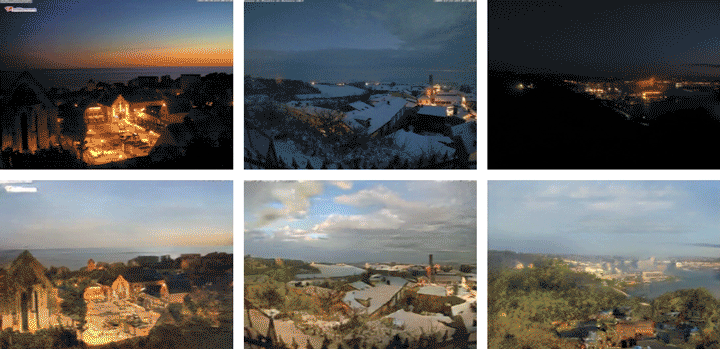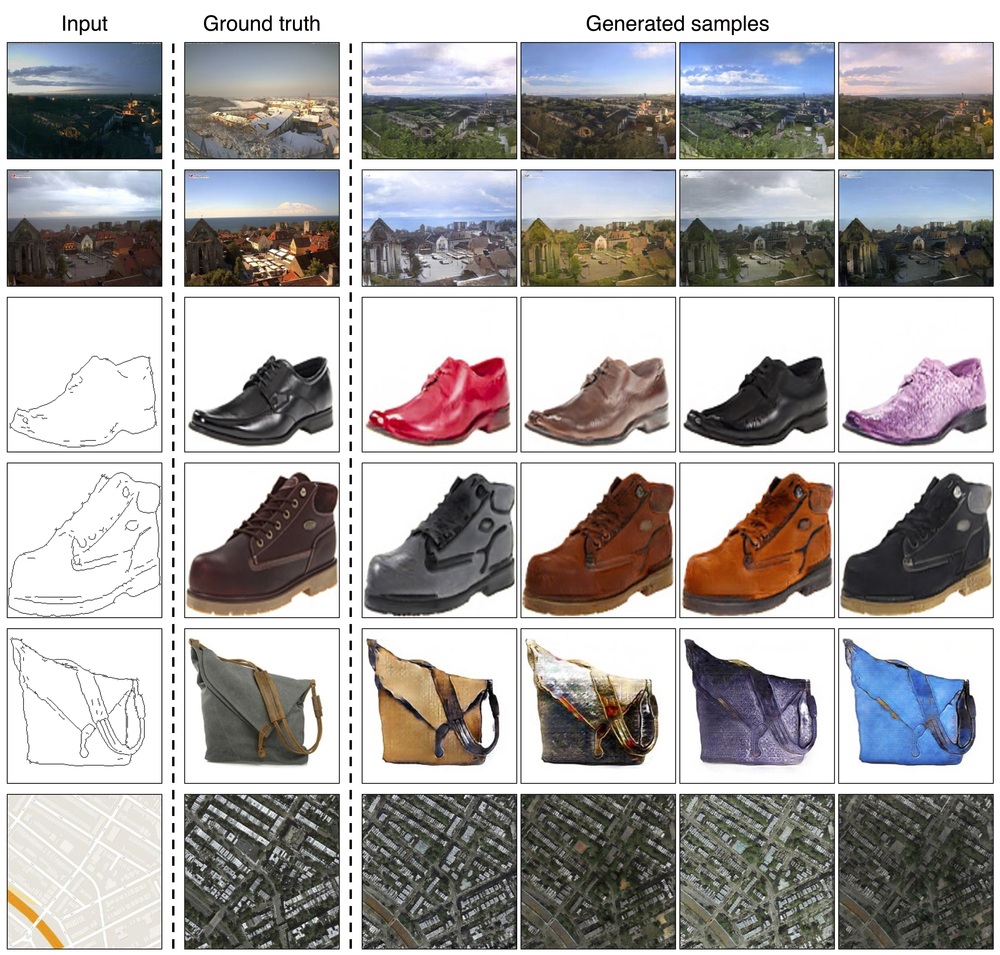Project Page | Paper | Video
Pytorch implementation for multimodal image-to-image translation. For example, given the same night image, our model is able to synthesize possible day images with different types of lighting, sky and clouds. The training requires paired data.
Note: The current software works well with PyTorch 0.41+. Check out the older branch that supports PyTorch 0.1-0.3.
Toward Multimodal Image-to-Image Translation.
Jun-Yan Zhu,
Richard Zhang, Deepak Pathak, Trevor Darrell, Alexei A. Efros, Oliver Wang, Eli Shechtman.
UC Berkeley and Adobe Research
In Neural Information Processing Systems, 2017.
- [Tensorflow] by Youngwoon Lee (USC CLVR Lab).
- [Tensorflow] by Kv Manohar.
- Linux or macOS
- Python 3
- CPU or NVIDIA GPU + CUDA CuDNN
- Clone this repo:
git clone -b master --single-branch https://github.com/junyanz/BicycleGAN.git
cd BicycleGAN- Install PyTorch and dependencies from http://pytorch.org
- Install python libraries visdom, dominate, and moviepy.
For pip users:
bash ./scripts/install_pip.shFor conda users:
bash ./scripts/install_conda.sh- Download some test photos (e.g., edges2shoes):
bash ./datasets/download_testset.sh edges2shoes- Download a pre-trained model (e.g., edges2shoes):
bash ./pretrained_models/download_model.sh edges2shoes- Generate results with the model
bash ./scripts/test_edges2shoes.shThe test results will be saved to a html file here: ./results/edges2shoes/val/index.html.
- Generate results with synchronized latent vectors
bash ./scripts/test_edges2shoes.sh --syncResults can be found at ./results/edges2shoes/val_sync/index.html.
bash ./scripts/video_edges2shoes.shResults can be found at ./videos/edges2shoes/.
- To train a model, download the training images (e.g., edges2shoes).
bash ./datasets/download_dataset.sh edges2shoes- Train a model:
bash ./scripts/train_edges2shoes.sh- To view training results and loss plots, run
python -m visdom.serverand click the URL http://localhost:8097. To see more intermediate results, check out./checkpoints/edges2shoes_bicycle_gan/web/index.html - See more training details for other datasets in
./scripts/train.sh.
Download the datasets using the following script. Many of the datasets are collected by other researchers. Please cite their papers if you use the data.
- Download the testset.
bash ./datasets/download_testset.sh dataset_name- Download the training and testset.
bash ./datasets/download_dataset.sh dataset_namefacades: 400 images from CMP Facades dataset. [Citation]maps: 1096 training images scraped from Google Mapsedges2shoes: 50k training images from UT Zappos50K dataset. Edges are computed by HED edge detector + post-processing. [Citation]edges2handbags: 137K Amazon Handbag images from iGAN project. Edges are computed by HED edge detector + post-processing. [Citation]night2day: around 20K natural scene images from Transient Attributes dataset [Citation]
Download the pre-trained models with the following script.
bash ./pretrained_models/download_model.sh model_nameedges2shoes(edge -> photo) trained on UT Zappos50K dataset.edges2handbags(edge -> photo) trained on Amazon handbags images..
bash ./pretrained_models/download_model.sh edges2handbags
bash ./datasets/download_testset.sh edges2handbags
bash ./scripts/test_edges2handbags.shnight2day(nighttime scene -> daytime scene) trained on around 100 webcams.
bash ./pretrained_models/download_model.sh night2day
bash ./datasets/download_testset.sh night2day
bash ./scripts/test_night2day.shfacades(facade label -> facade photo) trained on the CMP Facades dataset.
bash ./pretrained_models/download_model.sh facades
bash ./datasets/download_testset.sh facades
bash ./scripts/test_facades.shmaps(map photo -> aerial photo) trained on 1096 training images scraped from Google Maps.
bash ./pretrained_models/download_model.sh maps
bash ./datasets/download_testset.sh maps
bash ./scripts/test_maps.shFigure 6 shows realism vs diversity of our method.
-
Realism We use the Amazon Mechanical Turk (AMT) Real vs Fake test from this repository, first introduced in this work.
-
Diversity For each input image, we produce 20 translations by randomly sampling 20
zvectors. We compute LPIPS distance between consecutive pairs to get 19 paired distances. You can compute this by putting the 20 images into a directory and using this script (note that we used version 0.0 rather than default 0.1, so use flag-v 0.0). This is done for 100 input images. This results in 1900 total distances (100 images X 19 paired distances each), which are averaged together. A larger number means higher diversity.
If you find this useful for your research, please use the following.
@inproceedings{zhu2017toward,
title={Toward multimodal image-to-image translation},
author={Zhu, Jun-Yan and Zhang, Richard and Pathak, Deepak and Darrell, Trevor and Efros, Alexei A and Wang, Oliver and Shechtman, Eli},
booktitle={Advances in Neural Information Processing Systems},
year={2017}
}
If you use modules from CycleGAN or pix2pix paper, please use the following:
@inproceedings{CycleGAN2017,
title={Unpaired Image-to-Image Translation using Cycle-Consistent Adversarial Networkss},
author={Zhu, Jun-Yan and Park, Taesung and Isola, Phillip and Efros, Alexei A},
booktitle={Computer Vision (ICCV), 2017 IEEE International Conference on},
year={2017}
}
@inproceedings{isola2017image,
title={Image-to-Image Translation with Conditional Adversarial Networks},
author={Isola, Phillip and Zhu, Jun-Yan and Zhou, Tinghui and Efros, Alexei A},
booktitle={Computer Vision and Pattern Recognition (CVPR), 2017 IEEE Conference on},
year={2017}
}
This code borrows heavily from the pytorch-CycleGAN-and-pix2pix repository.


